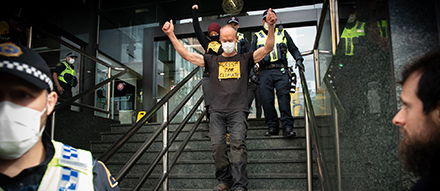The Tasmanian Liberal Government has introduced legislation to protect the rights of workers, and to deter unlawful interference with workplaces. The government signalled in August that it would re-introduce its anti-protest legislation which failed to pass in the Upper House in March last year. Source: Timberbiz
The Police Offences Amendment (Workplace Protection) Bill 2022 would strengthen the law of trespass and obstruction, making them more easily understood and enforced.
The Opposition has indicated it will support the Bill but will seek amendments.
The Government, meanwhile, says the Bill applies to all persons and businesses equally and gives Courts the ability to give higher sentences if appropriate for more serious offences and repeat offences.
If successful, protesters could be slapped with harsher fines or longer jail terms for action that obstructs streets or causes a nuisance to workplaces, where penalties would be more severe if a person is convicted of trespassing.
Corporate entities would also be included and could pay penalties of more than $100,000.
“It’s now more important than ever to ensure Tasmanians are free to go to work safely, without the risk that radical extremists invade their workplace,” Resources Minister Guy Barnett said.
“Intimidating, threatening, and endangering employees is not an option.
“I want to make it absolutely clear that the Government respects every Tasmanian’s right to free speech,” he said.
“This legislation does not – and the Government has no intention to – put in place anything that will limit lawful protesting.
At the same time, the Government makes no apology for ensuring Tasmanians can go to work and run their businesses in a safe manner free from disruption. And more so, it is incumbent on all of us to ensure there are no longer genuine risks to people’s safety from interference by extremist protesting in business operations.”
The Police Offences Amendment (Workplace Protection) Bill 2022 proposes:
- APPROPRIATE aggravated penalties where a court is satisfied that a trespass obstructed a business or undertaking, and clarify the elements of the trespass offence;
- APPROPRIATE aggravated penalties where a court is satisfied that a trespass caused a serious risk to the safety of the trespasser or another person; and
- APPROPRIATE penalties for the existing offence of public annoyance, and clarification that this offence includes unreasonable obstruction of the passage of vehicles or pedestrians on a street.
The Bill was released for two weeks public consultation, and feedback from submissions has been used to finalise the Bill before introduction. These submissions are available on the Department of Justice website.
“Labor governments and oppositions across the country have supported similar legislation and it is time that the Tasmanian Labor Opposition finally threw its support behind Tasmanian workers and not stand side-by-side with the Greens and the Bob Brown Foundation,” Mr Barnett said.
The Shadow Workplace Relations Minister Sarah Lovell said Labor welcomed the fact that Mr Barnett had “finally been forced to abandon his standalone draconian and unconstitutional legislation” and instead adopt Labor’s proposed approach of strengthening offences in the Police Offences Act.
“After six years of Minister Barnett using worker’s safety in a political game, we finally have legislation on the table that could see improved protection for workers against radical green protests,” Ms Lovell said.
“Labor will always support the right to protest, but we don’t support any action that places workers at risk.
“While we will be seeking to amend parts of the Bill before the Parliament to address what appear to be unintended consequences that go beyond the aim of protecting workers, we will support provisions that protect workers put at risk by radical green protests.”
But Ms Lovell said that if the government was genuine about worker safety it would also provide additional resources to the critically underfunded WorkSafe and implement all recommendations of the independent Boland Report, including legislating for Industrial Manslaughter.






